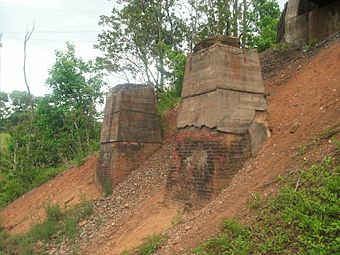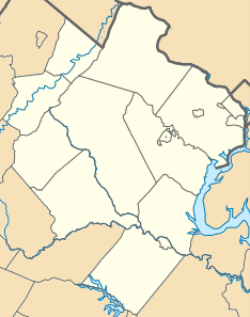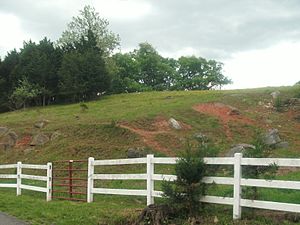Milford Battlefield facts for kids
|
Milford Battlefield
|
|

Remains of the former bridge at the battle site, May 2016
|
|
| Location | VA 340 and VA 665, Overall, Virginia |
|---|---|
| Area | 700 acres (280 ha) |
| Built | 1864 |
| Architectural style | Mid 19th Century Revival |
| MPS | Civil War in Virginia MPS |
| NRHP reference No. | 04000854 |
Quick facts for kids Significant dates |
|
| Added to NRHP | August 11, 2004 |
Milford Battlefield is a historic place in Overall, Virginia. It is found in both Warren County and Page County, Virginia. This area was the location of an important battle during the American Civil War. The fighting happened from September 22 to 24, 1864. This battle was part of the Valley campaigns of 1864. Today, the land where the battle took place is owned by private individuals.
Contents
The Battle of Milford
Many small military engagements happened at Milford during the Civil War. The most important one took place on September 22, 1864. This battle was connected to bigger events in the war.
Union Victories and Confederate Retreat
Union Major General Philip Sheridan had just won a big victory. He defeated Confederate Major General Jubal Early at the Third Battle of Winchester on September 19. After this loss, General Early's troops had to retreat south. They moved up the Shenandoah Valley.
Sheridan's forces chased after Early. They met again at the Battle of Fisher's Hill on September 21. Sheridan won that battle too. This forced Early's soldiers to keep retreating.
First Clashes and Retreats
On September 20, Confederate General Williams Carter Wickham met Union cavalry. These were soldiers from the 3rd Division, led by Brigadier General James H. Wilson. The fighting started near Crooked Run and the Front Royal Road.
The Confederates were pushed back across the South Fork of the Shenandoah River. On September 21, General Wilson attacked again. Some of his soldiers managed to get around the Confederates. They crossed the river at Kendrick's and Richard's Fords.
A running battle then began. The Confederates kept retreating southward up the valley toward Luray. They tried to make a stand twice. They had to retreat from the first spot. But they held their ground at the second spot, on the south bank of Gooney Run.
Artillery Duel and New Positions
An artillery duel started at Gooney Run. This means both sides fired cannons at each other. The cannon fire lasted late into the night. Later that evening, General Wickham's troops pulled back. They dug trenches along the slopes south of Milford.
Their lines stretched from the river eastward. They went to the steep slope near what is now Shenandoah National Park. The Southern soldiers burned a small bridge over Milford Run. This was to slow down the Union forces.
Union Reinforcements and Strategy
During the night, Union Brigadier General Wesley Merritt's cavalry arrived. They reinforced General Wilson's troops. This brought the total Union strength to two divisions. Each division had two brigades. They also had three to five artillery batteries.
Brigadier General George Armstrong Custer led the 1st Brigade. This brigade included soldiers from New York and Michigan. After midnight, the Union soldiers found Wickham's new position at Milford. The Union cavalry and horse artillery then moved south. They set up their cannons. Some of these cannons were placed where Skymont is today.
Other Actions at Milford
The Milford area saw other military actions during the war. Cavalry battles happened on June 24, 1862. More fighting occurred in early May 1864. There was also a battle on October 25–26, 1864. Union and Confederate troops also camped there at different times.
The Battlefield Today
Milford Battlefield covers about 700 acres. Most of this land is hilly. It lies between the South Fork of the Shenandoah River to the west. To the east are the Blue Ridge Mountains. The land is currently owned by private individuals.
Landscape and Features
During the Civil War, the land had fewer trees than it does now. But other than that, the landscape is much the same. Today, you can see a highway (U.S. Route 340) and a railroad track. There are also some scattered houses. These modern features do not make it hard to understand the battles that happened here.
The Page Valley becomes narrow at Overall. This, along with the main road, made the site important for military strategy during the war. The battlefield still has important features from the battle. These include old trenches and rifle pits.
The battlefield area includes three historic sites. These are the ruins of the Overall House, a historic cemetery, and a bridge support from an old turnpike. There are also thirteen historic structures. These include U.S. Route 340 (which was called the Luray and Front Royal Turnpike back then). There is also an old road, a cistern and well from the Overall House, seven rifle pits, and two earthworks.
The Milford Battlefield was added to the National Register of Historic Places in 2004.
 | William Lucy |
 | Charles Hayes |
 | Cleveland Robinson |





